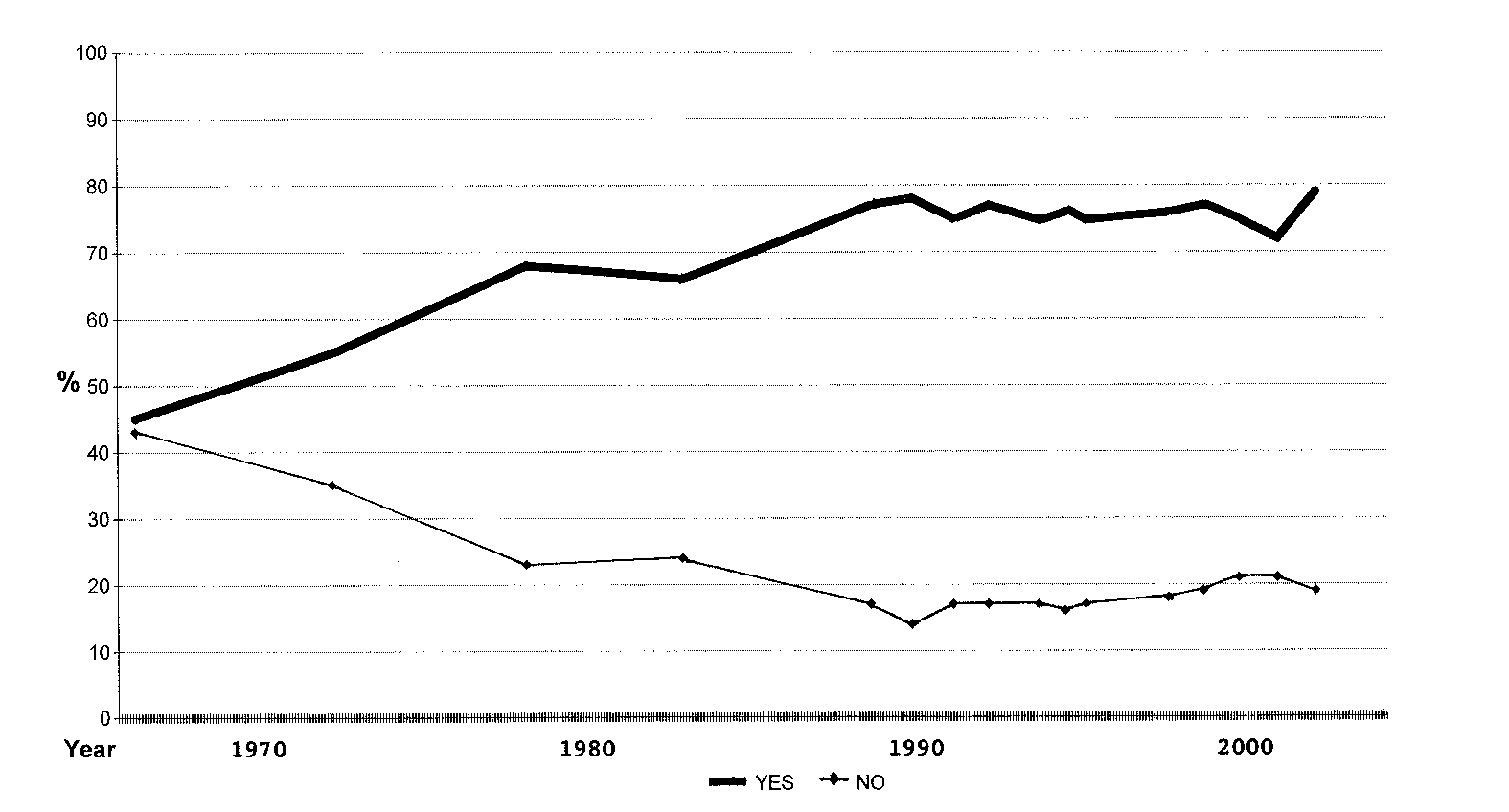Question: "When a person has an incurable disease that is immediately life-threatening* and causes that person to experience great suffering, do you, or do you not think that competent doctors should be allowed by law to end the patient's life through mercy killing, if the patient has made a formal request in writing?" * Prior to 1995 the question did not state that the disease was immediately life-threatening. |

|
|
The precise dates and percentages are as follows: (First date shown is date of data collection; parenthesized date is date of publication) Yes No Aug. 1968 (Aug. 1968) 45 43 Mar. 1974 (May 1974) 55 35 Sep. 1979 (Oct. 1979) 68 23 Feb. 1984 (Apr. 1984) 66 24 Jun. 1989 (Jul. 1989) 77 17 Aug. 1990 (Aug. 1990) 78 14 Oct. 1991 (Nov. 1991) 75 17 Oct. 1992 (Nov. 1992) 77 17 Mar. 1994 (Apr. 1994?) 75 17 Dec. 1994 (Jan. 1995) 76 16 Jul. 1995 (Aug. 1995) 75 17 Nov. 1997 (Mar. 1998) 76 18 Nov. 1998 (Dec. 1998) 77 19 Nov. 1999 (Dec. 1999) 75 21 Dec. 2000 (Jan. 2001) 72 21 Jan. 2002 (Feb. 2002) 79 19 |
現年58歲的尼克林森2005年因中風患上了「閉鎖綜合症」。這種疾病使他雖然神智清醒,卻全身癱瘓,無法自殺。
他一直尋求法庭保護任何願意幫助他結束生命的醫生。
英國司法部認為,如果法庭做出這樣的裁決將改變英國涉及謀殺的法律條規。
英國高等法院的裁決意謂著尼克林森的「求死權」案將展開全面的聆訊,其間醫學方面的證據也將提交給法庭。
在法庭做出這一裁決後,尼克林森的妻子在BBC一個電台節目中宣讀了他的聲明。
聲明說,非常欣慰地看到法庭將審理協助他人死亡的問題。
「21世紀的醫學仍然轄制於20世紀的死亡觀念再也不能讓人接受了。」
尼克林森通過一個特製的電子板與人溝通,他說在這一裁決之前,他的生命「乏味、痛苦、剝奪了意義、沒有尊嚴、無法忍受」。
當他被問及接下來的打算時,他通過電子板說,「時機恰當時我可以找醫生了。」
他還寫道:「我現在覺得還可以應對生命,可是不可能永遠這麼下去。」

 19世紀末20世紀初,一些西方學者懷著對種族主義、文化殖民主義的厭惡和對落後國家文化的理解與尊重,建立了“文化相對主義(cultural relativism)”,其中以美國人類學之父弗朗茲·博厄斯(Franz Boas 見圖)為個中翹楚。
19世紀末20世紀初,一些西方學者懷著對種族主義、文化殖民主義的厭惡和對落後國家文化的理解與尊重,建立了“文化相對主義(cultural relativism)”,其中以美國人類學之父弗朗茲·博厄斯(Franz Boas 見圖)為個中翹楚。